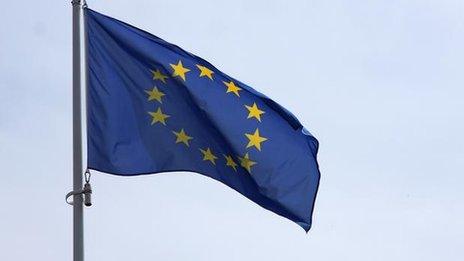Romanian and Bulgarian immigration: Boston families give their views
- Published
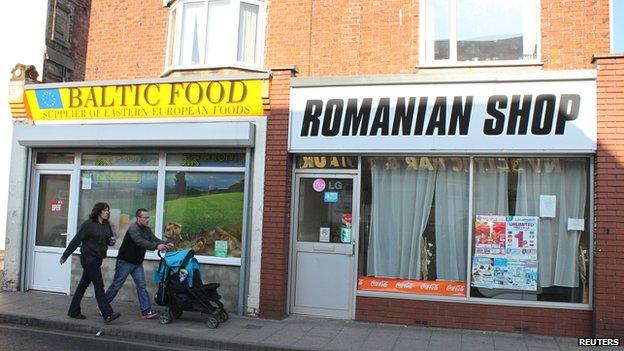
Boston in Lincolnshire has been called the "most Eastern European town in Britain"
Bulgarian and Romanian migration to the UK is expected to increase when working restrictions expire at the end of this year. How do families in the town called Britain's "most Eastern European" feel about another wave of immigration?
The Lincolnshire town of Boston has already been transformed by rapid immigration from Eastern Europe.
In 2001 virtually everyone in Boston described themselves as white British, but just 84% did so 10 years later.
The census showed that the district had the largest number of non-British EU passport holders outside of London, and one school now has two-thirds of pupils from migrant households.
Lincolnshire is one of the largest agricultural regions in the UK and many of those who settle in the town are employed picking crops and processing fruits and vegetables.
Boston has been dubbed "the most Eastern European town in Britain, external" and tensions among some sections of the community have spilled over into protest.
So how do three Boston families - born in England, Romania and Poland - feel about the prospect of more migrants moving there?
"I work really hard, and I'm really proud of it"
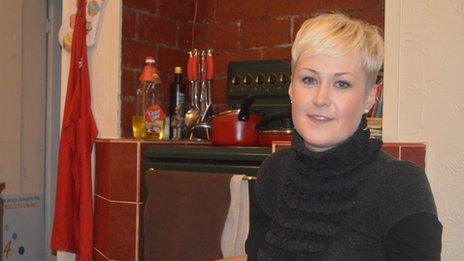
Milena Czaplinska, 32, moved from Poland to Boston five years ago so she could earn more money and have a better quality of life.
She works as a dispenser in a pharmacy and lives with her partner Marcin Kiusinski, a taxi driver, and their three-year-old daughter Oliwia.
She does not oppose more migrants moving to Boston and the UK, but believes the benefits they can claim should be restricted.
"If someone wants to come here they should work a minimum of a year before they can claim benefits," she says.
"I didn't even know England had a system like benefits because we don't have a system like that in Poland. I've never claimed any benefit and I work really hard, and I'm really proud of it.
"I pay tax, even for the British people who sit on the benefits."
Ms Czaplinska says some people - of all nationalities - abuse the benefits system by claiming money when they don't need to.
"They should give something to get something back, because my taxes are going for benefits people, and it's not fair," she says.
"If I can buy a house here and put something here to increase the economy of this country why can't somebody else do it?"
She says it would be good if people of all nationalities could integrate more.
She has had some bad experiences in Boston, including a customer refusing to be served by her and people shouting abuse at her in the street.
"I think the problem is Boston is a small town and some of the people who live here don't like changes. They don't like outsiders, if you know what I mean," she says.
But she believes immigration has benefitted the local economy, and believes many businesses would not be able to survive if migrant workers moved away.
"I think there should be restrictions put in place"
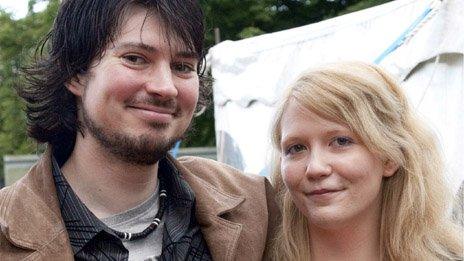
Anstice Potts, 24, is an administrator at a school and has lived in Boston and the surrounding villages for all of her life.
Her fiance Matthew Brown, a 34-year-old secondary school teacher, has also lived in the Boston area all his life.
"I think there are people in Boston who have strong opinions against immigration, but they are probably in the minority," says Ms Potts.
"Most people are not like Dean Everitt [organiser of a protest against immigration] but him and people like him get a lot of media coverage because they shout louder than everyone else.
"I think immigrants contribute more to the economy through taxes than they cost in public services, and they also bring in new skills."
While she does not object to more immigration, she thinks there should be tighter controls.
"I support the people who are coming across here to work and I don't want them all to be treated as if they are criminals or spongers in some way," she says.
"I think there should be restrictions put in place to stop those kind of people coming in so it doesn't affect the ones who are here to do good.
"They should have to work for a certain amount of time, for example one year, before being able to claim benefits, and should have a face-to-face interview because a lot are done over the phone."
Ms Potts said Boston had visibly changed due to immigration from Eastern Europe.
"The West Street area in particular has changed, because there were derelict car parks and empty shops, but now there are Eastern European supermarkets and we have all sorts of international restaurants and cafes," she says.
"The old people don't like the changes but I think we should embrace it. It's better than seeing empty shops and it's bringing money to the country."
She says migrant workers do a lot of jobs that English people don't want to do.
"There is a shortage of jobs in this area but English people don't want to take the initiative to start their own businesses, we just complain there are no jobs," she says.
"You can't blame people for seeking a better life because there are so many English people that go to Spain or France and buy a villa and don't bother to learn the language."
As a teacher, Mr Brown is used to having lots of English as Additional Language (EAL) pupils in his lessons.
"Despite the communication challenges they are very hard working and are trying to make a difference for their future," he says.
"Some of the most successful pupils who have made the most progress have been EAL pupils."
However, he is concerned about more potential immigration from Bulgaria and Romania.
"I don't think this should happen unless the government makes careful plans to ensure there are enough jobs and housing in the area and establishes clear rules about who is allowed to enter the country and who is entitled to claim benefits," he says.
Boston has had "a lot of bad press" recently about immigrants coming and claiming benefits, he adds.
"Although this may be true in some cases, I have also had personal experience of many immigrants who have made a success of themselves through hard work and have made a good contribution to the Boston area," he says.
"For example, I know that farmers in the area have relied upon immigrants to help their agricultural services because other people would not be willing to take on the hard work.
"Also, it is great to see that a lot of immigrants have had the initiative to set up their own businesses, such as car wash companies, during the hard times of the recession."
"Either you are in the European Union, or you are not"
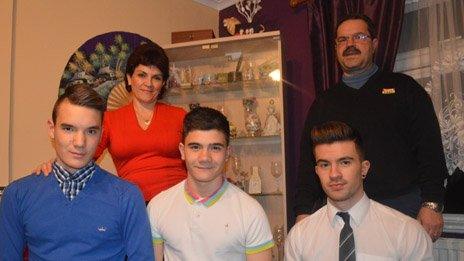
Liliana Demeter, a senior NHS nurse, moved from Romania to the UK for work and has lived in Lincolnshire since 2004.
She and her husband, an electrical engineer, have three sons.
Mrs Demeter believes the UK's existing employment restrictions for Bulgarian and Romanian people are unfair.
"Either you are in the European Union, or you are not in the European Union," she says.
"They only let skilled professions come, the ones they needed. The others you are not allowed to come."
But she thinks Romanian people would come to the UK on "the black market", without paying taxes, if the working restrictions remained.
She says the media stereotype of Romanians is inaccurate, however.
"I can take you to all my Romanian friends here in Boston, which are social workers, nurses and stuff like that, and you will see they are very good people, they have kids, we go to the church every Sunday," she says.
"I've had all these discussions that we come and we take the jobs. It's not true. We go to the interviews like they go to the interviews, am I right?
"Probably I think one of our advantages is that we have a culture for work, because we came from a communist country."
Her son Rares, 15, has many English friends but would like more Romanian people to migrate to Boston.
"Because I go to a grammar school, nearly everyone is English," he says.
"I'm really looking forward to seeing more people from Romania come over, because as soon as I hear that there's anyone from Romania in Boston near my age I just basically try and find out who they are and make friends with them."
You can find out more in a series of special programmes on BBC Radio Lincolnshire from 2 to 10 December.
- Published27 November 2013
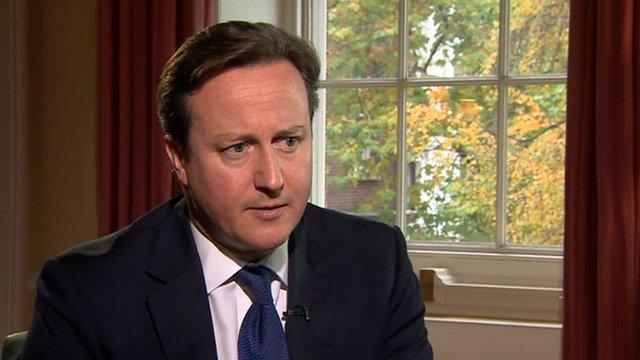
- Published12 September 2013
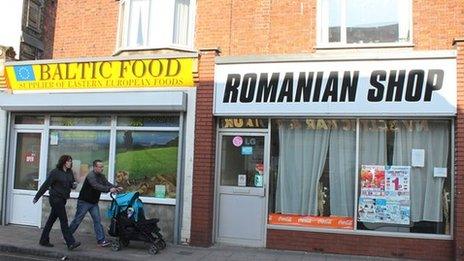
- Published18 November 2012
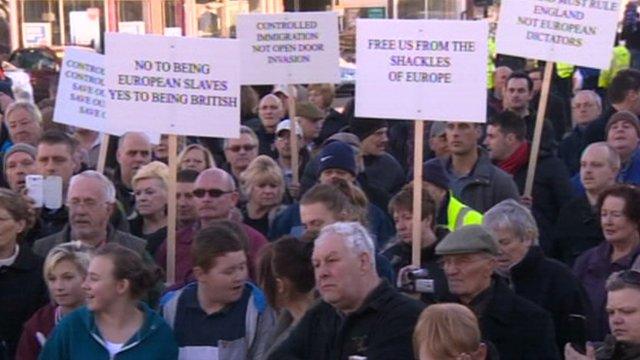
- Published16 August 2013
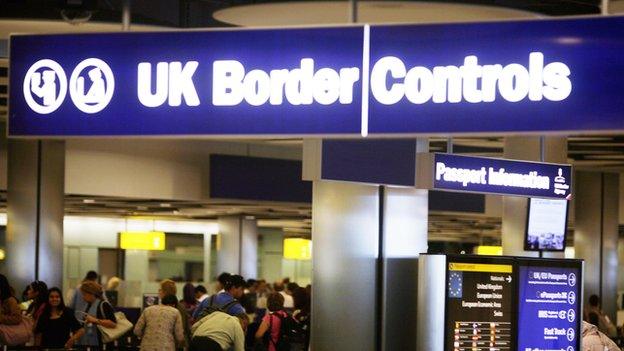
- Published14 May 2014
